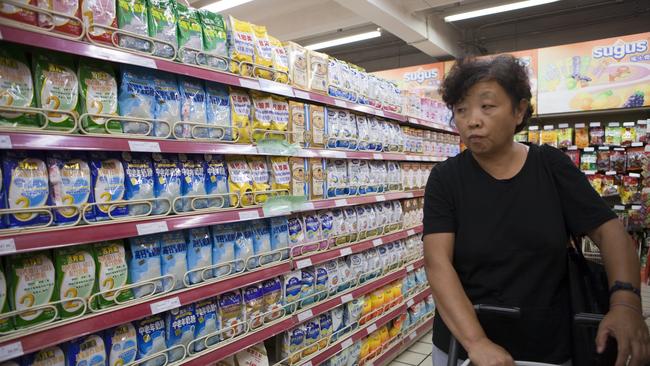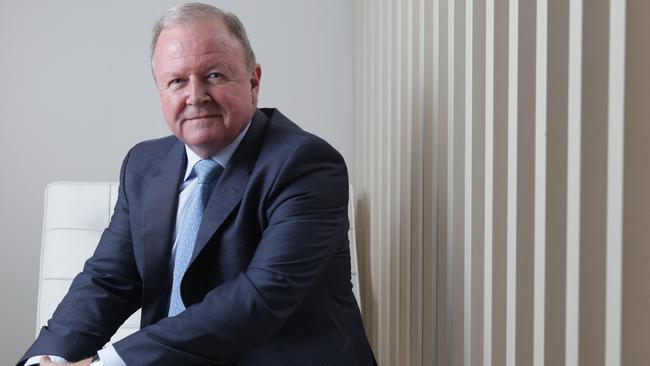Geoff Babidge reveals why A2 invested $250m buying a poor performing milk factory in New Zealand
A2 Milk’s CEO says there’s a good reason the company paid $250m for an underperforming NZ milk factory.

Half of the world’s infant formula consumption comes from China - with A2 Milk’s products still in demand despite heightened geopolitical tensions - justifying the need for the trans-Tasman dairy brand to acquire Mataura Valley Dairy in New Zealand and increase its production, chief executive Geoff Babidge says.
A2 has made its foray into infant formula production, spending $NZ268.5m ($251.17m) on securing a 75 per cent stake in Mataura, which has operated at a loss since it was commissioned in 2018.
But Mr Babidge said the plant - which has predominantly been a low-margin commodity producer and yet to scale up to full capacity - was on track to break even in the “short-term” and it envisaged it would produce up to 50 per cent of A2’s Platinum brand infant formula, with the company maintaining contracts with Synlait and Fonterra to produce the rest.
He said it would also open the door for A2 to capitalise on the “nutritionals” trend, expanding its range of milk-based adult nutrition powders as it morphs from being solely a brand owner to integrated manufacturer.
“It (Mataura) has been processing reasonably modest volumes, it hasn’t been operating at capacity - it’s a very new and world class facility. But it was only commissioned in 2018 and it takes time to build up the processors and systems to enable efficient operation … so it’s been going through that curve, and that’s a factor that’s been impacting on its financial performance,” Mr Babidge told The Australian.
“Once we will get involved and make changes over time and bring our own volume into the plant that will obviously bring about improved financial performance. Notwithstanding, the trading the losses that Mataura has been incurring, the work we have done in due diligence would indicate that it should be operating at EBITDA break-even, even in the short-term.
A2 will own the factory with China Animal Husbandry Group, which will retain a 25 per cent stake and has been looking for another “strategic investor” since late 2019, after it warned it needed an urgent cash injection to maintain operations beyond May 31, 2020, with Macquarie Capital and DG Advisory appointed to manage the process.
Mataura lost $NZ47.08m last financial year, and $NZ16.8m the year before that. But financial performance aside, China Animal Husbandry Group needed to also sell down its holding to at least 60 per cent to meet the terms of a $NZ115m loan it had with China Construction Bank Corporation.

Mr Babidge said the acquisition of Mataura would strengthen ties with China, given China Animal Husbandry Group will retain a 25 per cent stake and be a key partner in ensuring the company maintains access to the Chinese market. This is particularly important given Chinese regulatory sensitivity around infant formula, not to mention the heightened geopolitical tensions between China and Australia.
But Mr Babidge said the investment in Mataura was more about A2 taking a long-term view, rather than seeking to smooth short-term hiccups in Chinese trade or play up A2’s New Zealand origins at a time when Beijing is increasingly banning or imposing tariffs on Australian farm commodities.
“The basis for our investment in Mataura Valley Milk is that it goes to our medium term strategy to provide the best nutritional dairy products to our global consumers based on the natural goodness of the A2 protein. Regardless of the global tensions and challenges from the pandemic we continue to adapt and supply our unique nutritional products to consumers,” Mr Babidge said.
“The Chinese infant nutrition category represents around 50 per cent of world consumption of infant formula, so it’s a very important market for a player such as A2 to be engaged in, that’s the first point. The second point, it gives A2 the opportunity to build on our strategic relationships. The business model is one where we very much like to enter into long-term, mutually beneficial relationships with partners.
“That started with China State Farm in 2012, Synlait Milk in the same year, we have developed a relationship with Fonterra, and now we have got the opportunity to develop a new partnership with China Animal Husbandry Group, which happens to have a connection with China State Farm. So it does build on our business model of building on relationships that have a mutual benefit for the medium term.”
It comes as A2’s shares are trading at two year lows to around $11.03 in early afternoon trade on Wednesday, after it warned last month of a collapse in the lucrative Chinese daigou (trusted shopper) trade and slashed its full year revenue forecast by up to 28 per cent.
Mr Babidge said the acquisition of Mataura Valley would also allow A2 to manufacture more nutritional products. The COVID-19 pandemic has highlighted the importance of health, wellness and nutrition and will fuel further growth in A2’s adult nutritional products, which currently generate about $80m in revenue a year.
Milk-based nutritional powders are becoming a big business. Freedom Foods, where Mr Babidge served as chief executive before joining A2 early last decade, has offloaded its cereals and snacks business to focus more on nutritional and plant-based protein products, after investing $300m in building a new plant at Shepparton in the past three years.
“Yes, Mataura Valley is appropriate for us for infant formula, but it’s also appropriate for us to be able to build manufacturing volume of other nutritional products, which are currently outsourced products such as our Smart Nutrition product or other forms of powder products that have value-added A2 properties,” Mr Babidge said.
“This again, gives us the flexibility to get in, do the research and development and implement those products at our own facility, so we see that as pretty important.”
Morgans analyst Belinda Moore said while she expected the Mataura acquisition to dilute earnings per share and “increase the capital intensity” of A2, it made sense and the ability to launch new A2 products was appealing.
“It further reinforces that A2 is a New Zealand company. We also think it will ultimately prove to be the correct move on the regulatory front as we expect that China regulations may eventually require brand owners to control the supply chain,” Ms Moore said.
“Additionally it will allow A2 to launch new products overtime.”







To join the conversation, please log in. Don't have an account? Register
Join the conversation, you are commenting as Logout